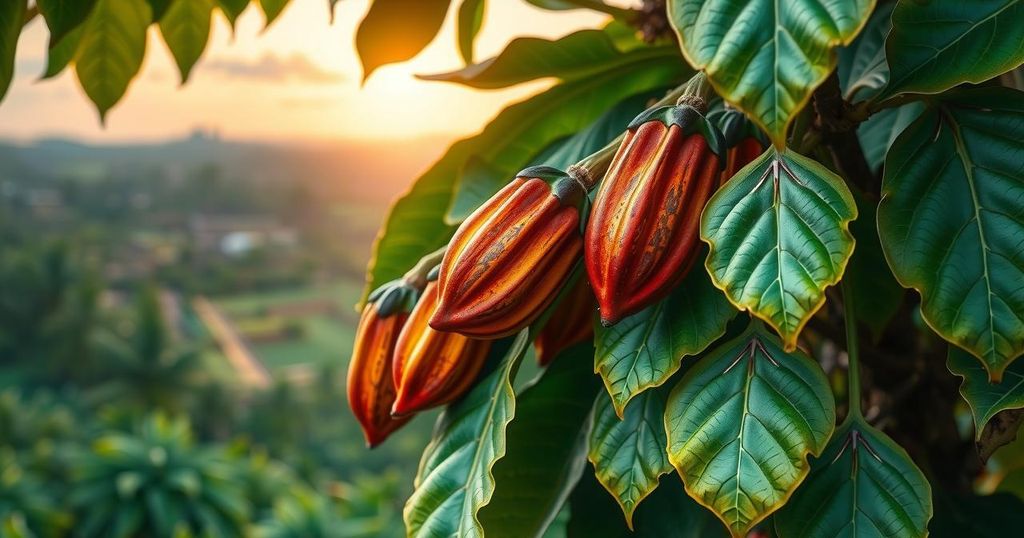Cocoa Crisis: Impact of Climate Change on Chocolate Production

Climate change significantly threatens cocoa production, causing prices to spike 400% and diminishing crop yields. A Christian Aid report highlights the heat’s adverse effects on crucial cacao-growing regions in West Africa. The increasing temperatures and unpredictable weather patterns have created economic uncertainty for growers and chocolate manufacturers alike.
Chocolate production faces significant challenges due to climate change, with cocoa prices soaring 400% recently. A report by Christian Aid indicated that extreme heatwaves in West Africa, exacerbated by climate change, have drastically affected cocoa harvests in critical regions like Côte d’Ivoire and Ghana. The unstable climate is causing enormous financial strain on cocoa growers and chocolate manufacturers alike, prompting concerns about the sustainability of the industry.
As temperatures exceed optimal growth conditions, cocoa production has steadily declined, resulting in record-high prices globally. An alarming proportion of cacao-producing areas have experienced increased heat stress, leading to reduced crop yields. Recent data revealed that human-induced climate change added weeks of excessively high temperatures in regions critical for cacao cultivation, undermining traditional farming practices and threatening livelihoods.
Industry experts, including Andy Soden from Kernow Chocolate, emphasize the immediate impact of climate disruptions on supply and pricing structures. Chocolate companies, large and small, are grappling with rising production costs, which could ultimately affect consumers through higher retail prices. Many small manufacturers are at risk of extinction without significant reforms and support for sustainable practices.
Osai Ojigho of Christian Aid underscored the dire need for targeted climate finance for cocoa producers. Emphasizing cocoa’s economic importance for many vulnerable communities, she insists on the necessity of reducing emissions and aiding farmers adapting to climate impacts. Advocacy for fair pricing will ensure farmers can maintain viable operations while implementing environmentally sustainable practices.
Furthermore, cocoa growers like Aurelia have reported devastating losses due to climate-induced crop failures. The widespread issue has resulted in food insecurity and diminished economic output. Gemma Whitaker from Whitakers Chocolates reinforces the commitment to supporting sustainable farming and fair trade practices, emphasizing the importance of ethical sourcing in maintaining chocolate’s legacy.
As the cocoa industry faces unprecedented challenges due to climate change, the potential for collaborative action among governments, businesses, and producers is crucial. By advancing supportive trade policies and equitable financial assistance, stakeholders can pave the way for a sustainable future for cocoa farming and the chocolate industry.
The cocoa crisis reveals the severe impact of climate change on chocolate production, with prices surging and farmers struggling to adapt. With the climate altering optimal growing conditions, cocoa growers in West Africa face a precarious future, prompting calls for greater climate finance and stringent emission cuts. Collaboration among stakeholders is essential to safeguard the livelihoods of cocoa farmers and sustain the chocolate industry against climate adversity.
Original Source: reliefweb.int







